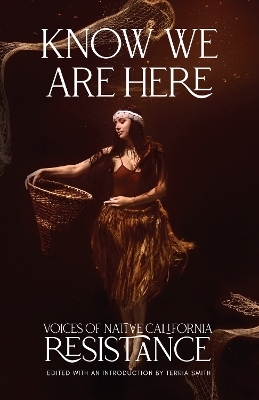
Know We Are Here
Heyday Books (Verlag)
978-1-59714-606-7 (ISBN)
Collecting over twenty-five essays written by more than twenty California Indian authors, Know We Are Here surveys many of the ways California’s Indigenous communities are resisting the legacies of genocide. Focusing on the particular histories, challenges, and dynamics of life in Native California—which are often very different from elsewhere in the United States—the book collects essays from writers across the state. It encompasses the perspectives of both elders and the rising generation, and the contributors include activists, academics, students, memoirists, and tribal leaders. The collection examines histories of resistance to colonialism in California, the reclaiming of cultures and languages, the connection of place and nature to wellness in tribal communities, efforts to overhaul the racist presentation of California Indians in classrooms and popular culture, and the meanings of solidarity in Native California. Unifying the book is an introduction by Terria Smith (Torres Martinez Desert Cahuilla Indians), editor of the renowned and long-running magazine News from Native California. This book is an indispensable resource for California Indian readers, educators of all levels in California, and students in Native studies courses nationally.
Terria Smith is the editor of News from Native California magazine and director of the Berkeley Roundhouse, Heyday’s California Indian publishing program. She is a tribal member of the Torres Martinez Desert Cahuilla Indians in Southern California and an alum of the UC Berkeley Graduate School of Journalism.
Contents
Introduction by Terria Smith
HISTORIES OF RESISTANCE
Deborah A. Miranda, “‘Dear Sonora’: Writing to a Fourth Grader about Her Project”
Greg Sarris, “Fidel’s Place”
Michael Connolly Miskwish, “Hutnyilshs: The Black Dog Nation”
Deborah Dozier, “We Are Still Here”
Rose Soza War Soldier, “Speaking Out: Rupert Costo and the American Indian Historical Society”
CULTURE AND LANGUAGE
Greg Sarris, “Maria Evangeliste”
Deborah A. Miranda, “Learning How to Fish: A Language Homecoming Journal”
Jayden Lim, “False Images and Young Minds: Sounding off on History, Racism, and Education”
River Garza, “Weaving through the College Experience”
Deborah A. Miranda, “Petroglyphs”
PLACE, NATURE, AND WELLNESS
Rose Ramirez and Deborah Small, “Saging the World”
Cutcha Risling Baldy, “The G-O Road: Thirty Years Later”
Michelle L. LaPena, “Water + Oil”
Cutcha Risling Baldy, “Water Is Life: The Flower Dance Ceremony”
Save California Salmon, “California Can’t Promise Truth and Healing While Forcing Salmon into Extinction”
Michelle L. LaPena and Viola LeBeau, “The West Berkeley Shellmound: A Legal Battle That Has Inspired a Generation”
EDUCATION
Olivia Chilcote and Chris Medellin, “Education as Self-Determination”
Maura Sullivan, “Creating Ceremonies to Protect Us from Traumatic Research”
Rose Soza War Soldier, “Teaching about Race in a University”
Vincent Medina, “A Word with Chiitaanibah Johnson”
Emily Clarke, “My University, My Ancestors”
SOLIDARITY
Rose Soza War Soldier, “California Indians and California Love: Belonging, Kinship, and Land”
Vanessa Esquivido, Maya Esquivido, and Morning Star Gali, “Black Lives Matter on Indigenous Land: Solidarity in Sacramento”
Ursula Pike, “En la Noche—In the Evening”
Cindi M. Alvitre, “Coyote Tours: Unveiling Native LA”
References and Notes [bibliographies]
Permissions
About the Contributors
| Erscheinungsdatum | 31.05.2023 |
|---|---|
| Zusatzinfo | Illustrations |
| Verlagsort | Berkeley |
| Sprache | englisch |
| Maße | 139 x 215 mm |
| Themenwelt | Literatur ► Biografien / Erfahrungsberichte |
| Literatur ► Essays / Feuilleton | |
| Sozialwissenschaften ► Ethnologie | |
| Sozialwissenschaften ► Soziologie | |
| ISBN-10 | 1-59714-606-4 / 1597146064 |
| ISBN-13 | 978-1-59714-606-7 / 9781597146067 |
| Zustand | Neuware |
| Haben Sie eine Frage zum Produkt? |
aus dem Bereich


